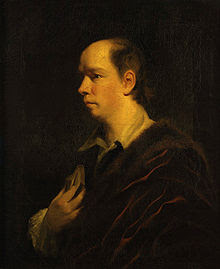
This novel was written in 1766, just at the dawn of the novel form, and it certainly shows. The charming, completely unbelievable central story, of a vicar and his family, is constantly interrupted by an array of other forms: the ballad; the sermon; the religious argument; and, what the hell, let’s have another ballad again.
The story – when you can see it for the ballads – is focused on the vicar’s evil landlord, and his cunning and successful plan to seduce and then abandon one of the vicar’s daughters. This prostrates the vicar, which I didn’t quite understand, as he seems to not put much stock in his daughters. In the early stages of the book, when one of the girls claims she had read enough to join in one of the (eternal) religious arguments. The vicar finds this hilarious, and responds:
“Very well . . . . that’s a good girl, I find you are perfectly qualified for making converts, and so go help your mother to make the gooseberry pie!”
I’d like to shove the gooseberry pie down his stupid throat: screaming ‘Dorothy Parker! Virginia Woolf! Joyce Banda!’. When the unfortunate girl is gone, he mourns her in the most touching manner:
“The honour of our family is contaminated . . . had she but died!”
However much of the book has a certain moral charm, and is full of wise advice:
Man little knows what calamities are beyond his patience to bear till he tries them
and, the last line of the book:
It now only remained that my gratitude in good fortune should exceed my former submission in adversity
This high moral tone is interesting, because apparently Goldsmith himself was a notable gambling addict, and only barely graduated from his theology degree: “his education seemed to have given him mainly a taste for fine clothes, playing cards, singing Irish airs and playing the flute.” This makes him sound like rather a fun guy and makes me regret my misspent university days, which I mostly used for studying.
Let’s end with this lovely description of the vicar’s wife, in an argument:
The dispute grew high while poor Deborah, instead of reasoning stronger, talked louder, and at last was obliged to take shelter from defeat in clamour.
I love that. It’s practically been worth all the ballads, just to get to that one line.
